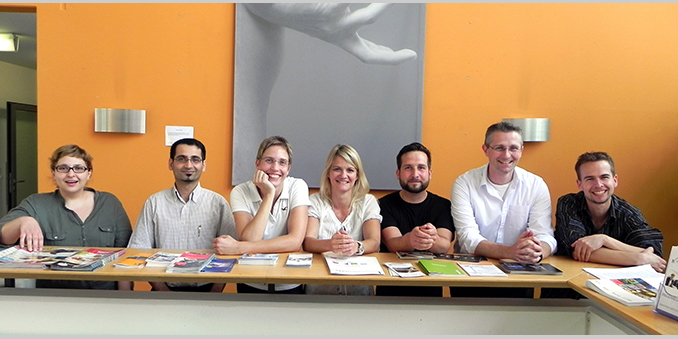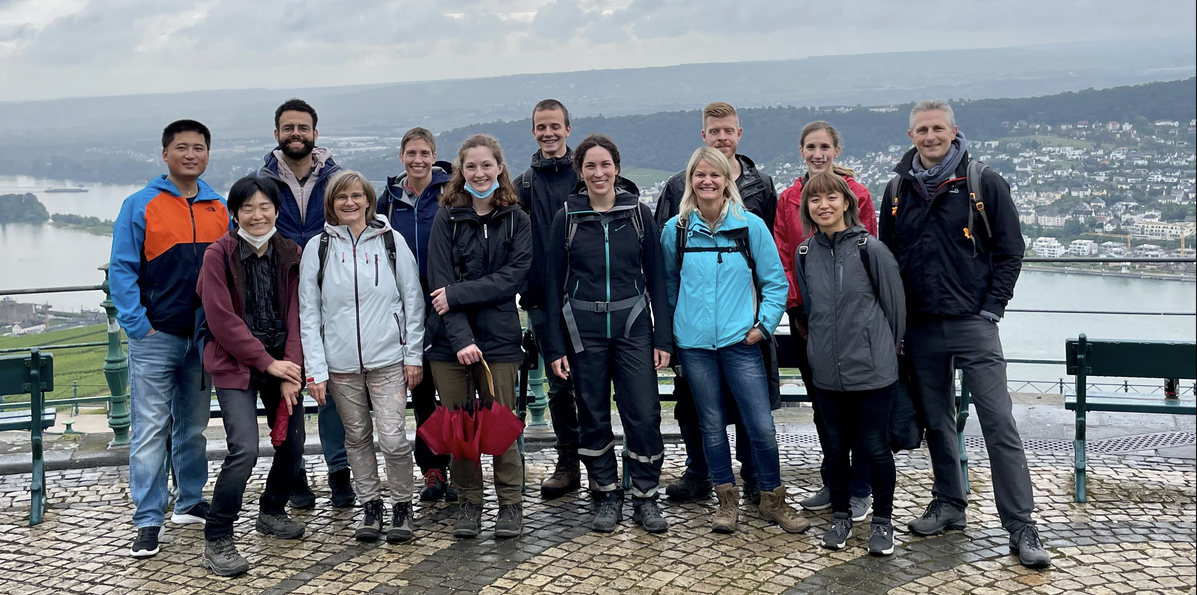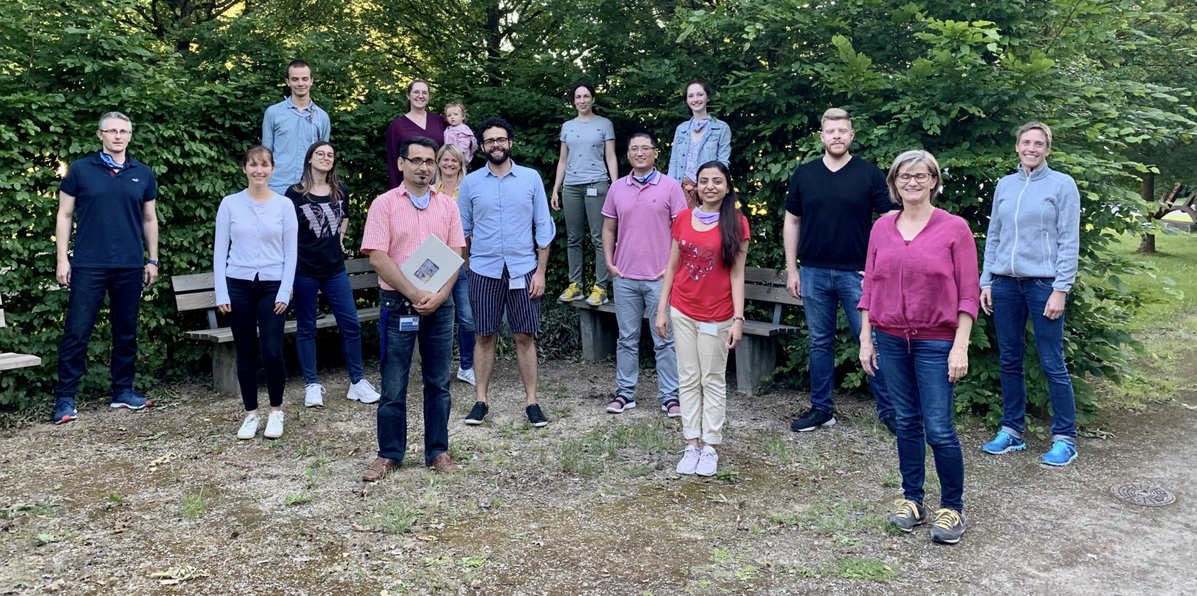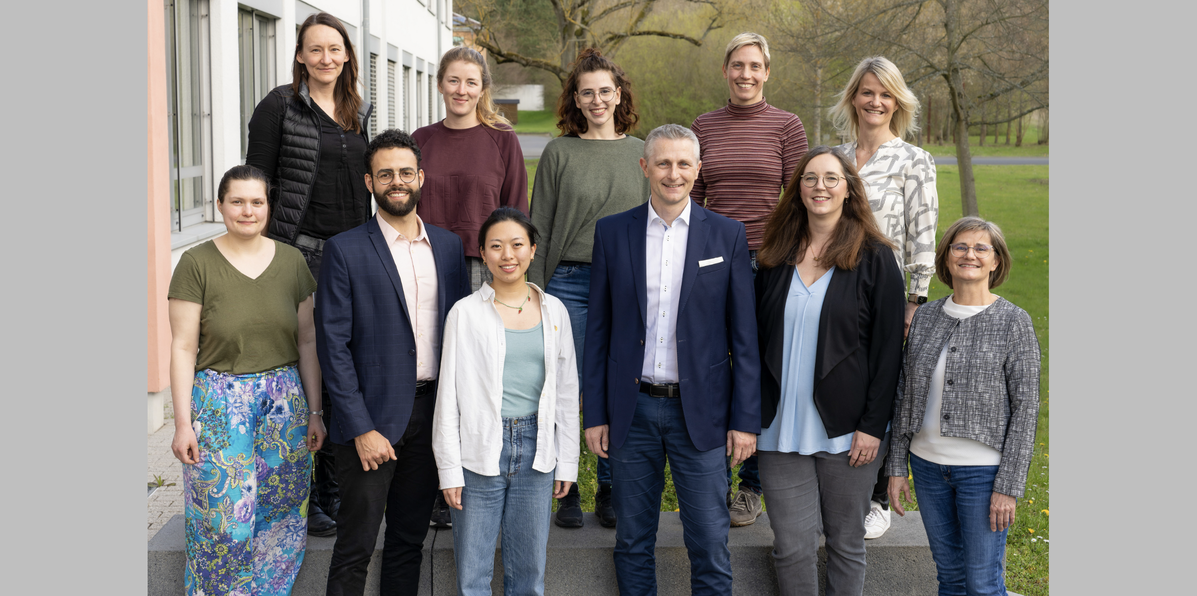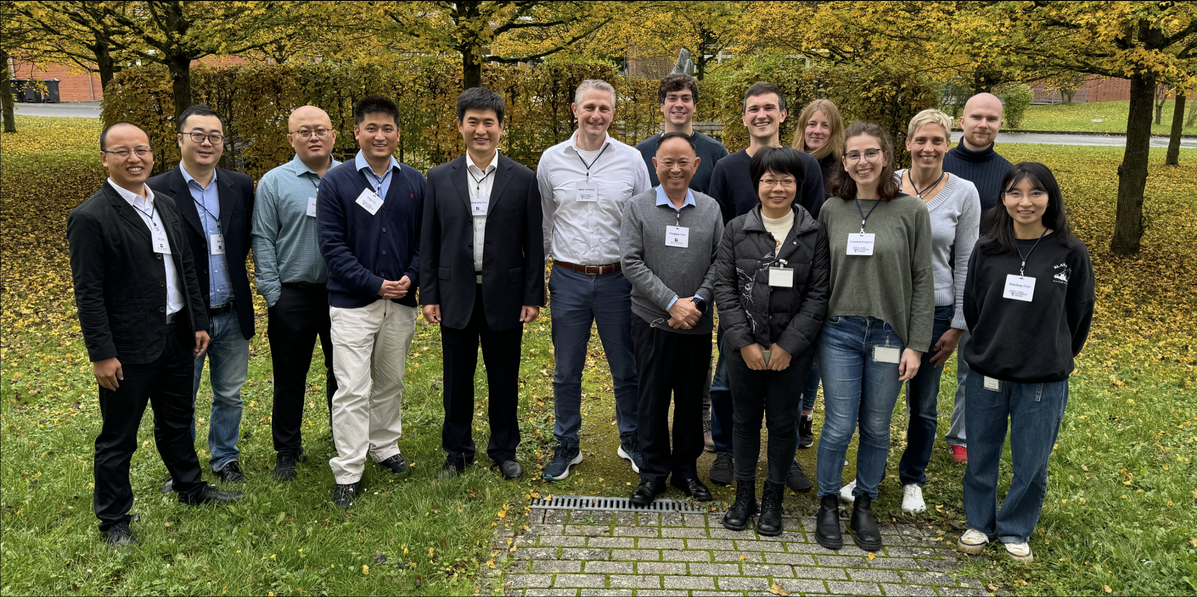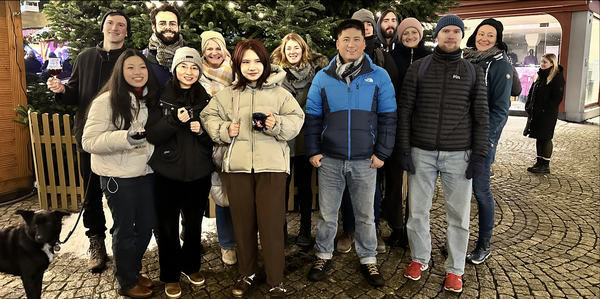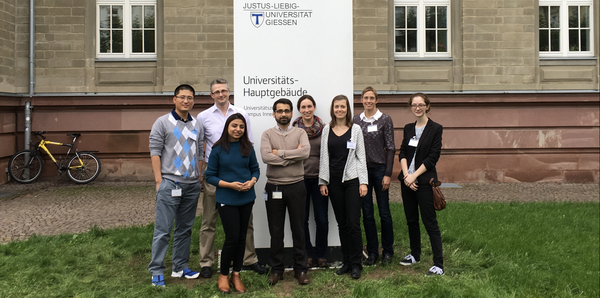News & Activities - AG Schetelig
2024-10 | Publication in Trends in Biotechnology: Biotechnology-enhanced genetic controls of the global pest Drosophila suzukii

2024-09 | Publication in STAR Protocols: Protocol for genetic engineering in Drosophila suzukii using microinjection

Ying Yan's lates publication in STAR protocols offers a step-by-step protocol for genetic engineering using microinjection. This guide covers everything from fly stock culturing and food preparation to injections (including preparations of the needle, injection mix, egg collection plates and documentation sheet, egg collection, dechlorination, dessiccation and the microinjection itself), and the downstream work following either transposon-mediated germ-line transformation, recombinase-mediated genome trageting, or CRISPR-mediated gene editing!
2024-05 | Publication in the Int J Molecular Sciences: Challenges of RNAi-mediated gene silencing in Aedes mosquitoes

2024-02 | Fruit Fly News features REACT
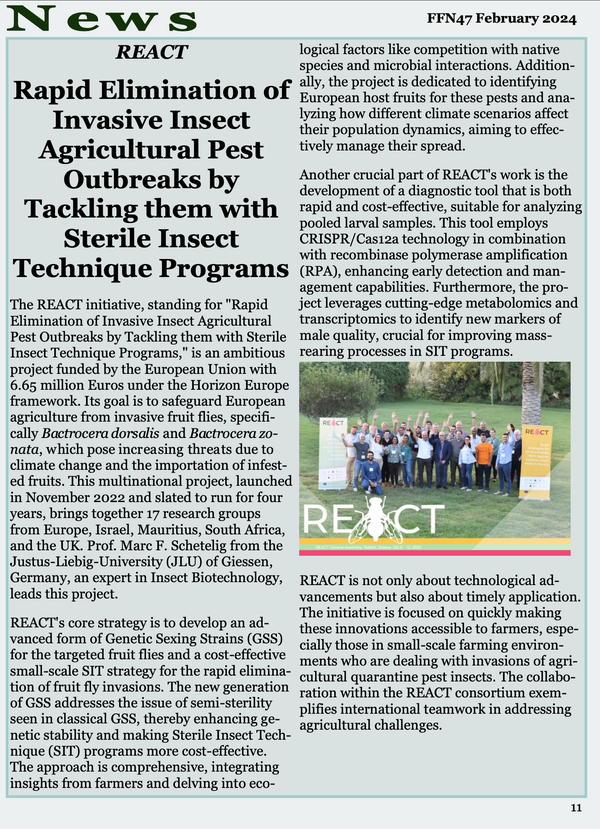
The current FFN Issue (#47, February 2024) presents the REACT initiative, and its goal to safeguard European agriculture from the invasive fruit flies Bactrocera zonata and Bactrocera dorsalis (p. 11). Furthermore, Andrea Moyano, Postdoc at the Institute of Molecular Biology of the National Research Council in Pavia, Italy, and part of the REACT team, shares her story in the “young scientists’ corner” (p. 17).
2024-01 | Habilitation Dr. Ying Yan
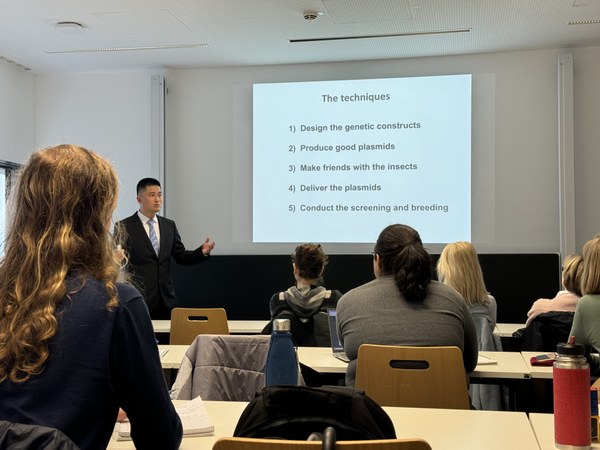
Upon receiving the Habilitation title, Dr. Yan expressed his tremendous appreciation to all colleagues at the IBPP who have been incredibly inspiring and supportive. He also extended deep gratitude to the academic council of Faculty 09 for considering and processing this application.
2023-12 | Successful defense of PhD thesis
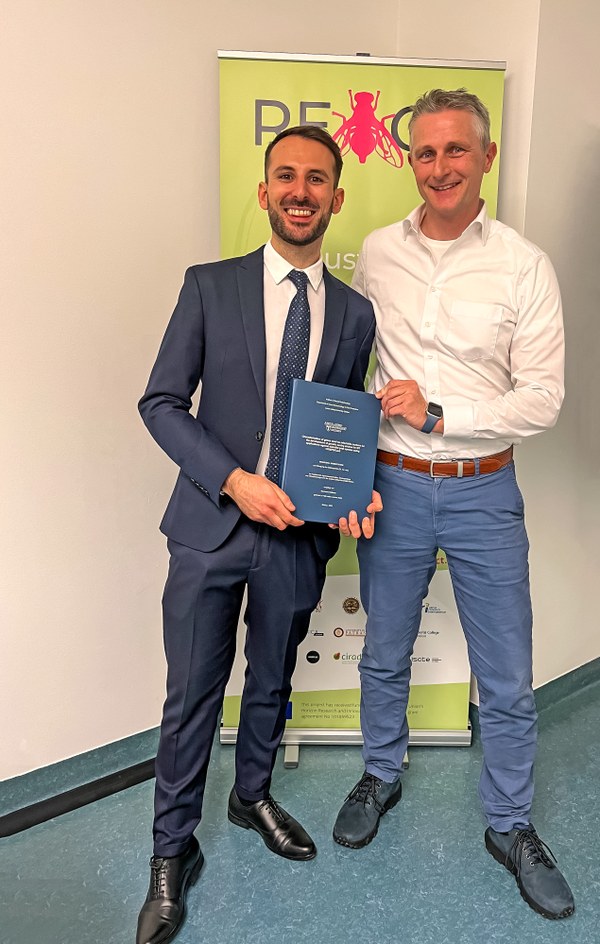
The cumulative thesis aims to identify the molecular background of the famous temperature-sensitive lethal phenotype in medfly, and includes three studies. In the first study, the temperature sensitivity of different medfly strains was assessed (published in Insects), in the second one, the putative genomic location of the tsl gene characterized (published in G3), and in the third one, a potential tsl candidate gene analyzed (published 02/24 in BCM Biotechnology).
Congratulations, Dr. Sollazzo!
2023-11 | Meeting on crop protection in Rome

2023-10 | Genetic Sexing Strain Research for Quarantine Species
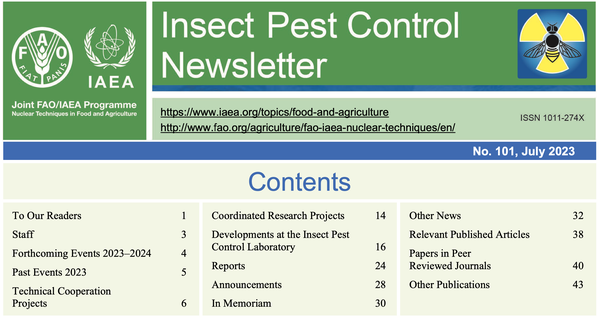
Further details are available in the Insect Pest Control Newsletter, Issue No. 101, on page 33.
... And if you are wondering what the International Atomic Energy Agency (IAEA) has to do with pest control, watch their animated infographic, "Using Nuclear Science to Control Pests"
2023-10 | Academic delegation from CAAS-AGIS at JLU
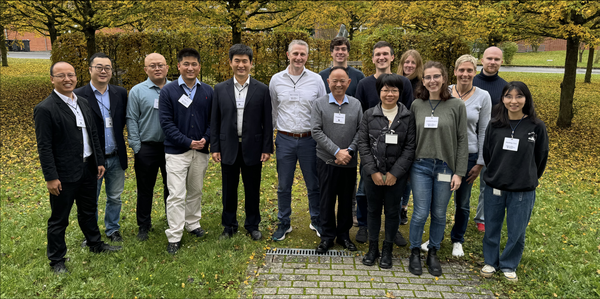
2023-10 | Publication in the Int J Molecular Sciences: Improved piggyBac Transformation
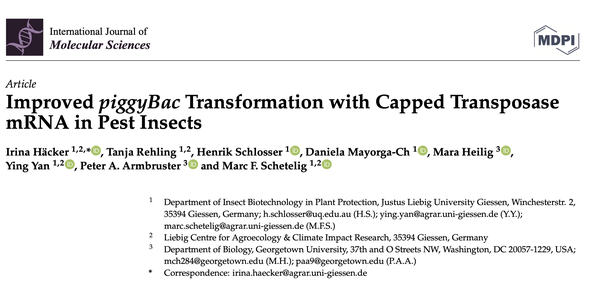
Read our new publication on improved piggyBac transformation with capped transposase mRNA in pest insects and get the job done faster! Irina Häcker and colleagues show a systematic comparison of transgenesis efficiencies in Aedes mosquitoes. Suppling piggyBac transposase as capped mRNA increased the average transformation efficiency in Aedes aegypti tenfold, from less than 5% (plasmid source) to about 50%.
2023-08 | iNaturalist - everyone can contribute to science

Visit the REACT Citizen Science project on iNaturalist, and help us to learn more about the dispersion of the Oriental fruit fly and the Peach fruit fly. So far, we have more than 800 observations from almost 600 observers. Many thanks!
2023-06 | REACT goes on air
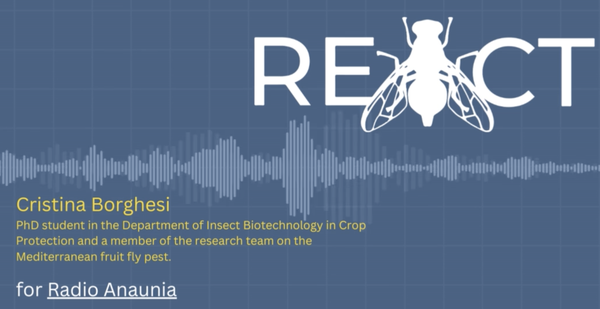
Cristina Borghesi talks about REACT on Radio Anaunia! Read more about our EU funded project REACT and listen to the Italian radio interview here.
2023-05 | Publication in the Int J Molecular Sciences: Protocol for Extraction of Bacterially Produced dsRNA
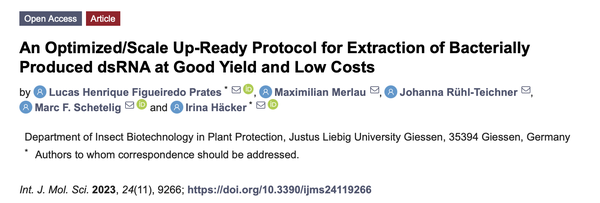
Learn here how to get bacterially produced dsRNA at good yield and low costs, using an optimized acidic phenol-based protocol! Lucas Prates et al. compared the dsRNA quality and yield as well as costs of extraction of their new, optimized protocol with other protocols available in the literature.
2022-11 | REACT


We are very happy to announce the start of REACT! REACT stands for "Rapid elimination of invasive agricultural insect pest outbreaks by tackling them with Sterile Insect Techniques programs" and is an EU-funded project coordinated by our department. With 15 great partners from 12 countries, we are aiming to develop long-term environmentally friendly response strategies and novel sustainable tools to protect fruit and vegetable production and export capacities from two invasive insect pests of EU priority: Bactrocera dorsalis and Bactrocera zonata. Visit REACT and learn more about the project, the partners, the pests and all current activities at react-insect.eu!
2021-06 | Publication in the Int J Molecular Sciences: the inducible CRISPR/Cas9 system in D. suzukii

2021-06 | Publication in Scientific Reports: the early female-killing system in D. suzukii

The paper “A transgenic female killing system for the genetic control of Drosophila suzukii”, is now published in Scientific Reports. In this research, one of the first female-killing systems in the global pest Drosophila suzukii was developed, which can facilitate the genetic control of this species.
2021-02 | Book on "Area-Wide Integrated Pest Management published by Tayler-Francis/CRC
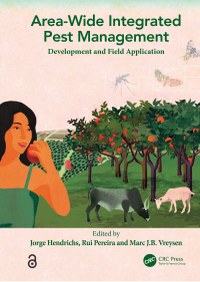
This new book addresses various fundamental components of AW-IPM. It is a great collection of chapters from 184 experts from more than 31 countries and includes many technological advances in the areas of genetics, molecular biology, microbiology, resistance management, and social sciences that facilitate the planning and implementing of area-wide strategies. Our chapter on Genome Editing and its Applications for Insect Pest Control summarizes the potential of novel technologies and discusses if they are a 'curse of blessing' for the insect pest control field.
2021-01 | 2nd edition of the “Sterile Insect Technique” book published by Tayler-Francis/CRC

The second edition of the "bible" on the Sterile Insect Technique has been published that updated and considerably expanded the content of the first edition from 2005. A great variety of subjects of the SIT is covered, from the history to improved prospects for its future application. The major chapters discuss the principles and technical components of applying sterile insects. Other chapters deal with supportive technologies, economic, management, and environmental considerations, and the socio-economic impact of AW-IPM programs that integrate the SIT. In addition, this second edition includes six new chapters covering the latest technologies in this field. Read more on one of those chapters about Applying Modern Molecular Technologies in Support of the Sterile Insect Technique by Irina Häcker, Kostas Bourtzis and Marc F. Schetelig.
2021-01 | Publication in Nature Communications: the white pupae gene.

see also ProLOEWE News, Gießener Allgemeine, Press release JLU, International Atomic Energy Agency News
2021-01 | Publication in Gene: the β2-tubulin promoter in D. suzukii

The paper “Characterization of the Drosophila suzukii β2-tubulin gene and the utilization of its promoter to monitor sex separation and insemination”, is now published in Gene. This research developed one of the first sexing systems in the devastating pest Drosophila suzukii using β2-tubulin gene promoter.
2020-12 | iFZ Master Award 2020 to Yukino Kobayashi, Gießen

Congratulations Yuki!
Ms. Yukino Kobayashi won the iFZ Masters 2020 Award from the Interdisciplinary Research Center (iFZ) of the Justus-Liebig-University Giessen. Her master thesis was supervised by Dr. Ying Yan and focused on developing genome editing tools for the invasive agricultural pest Drosophila suzukii.
We wish you all the best for your next steps!
2020-11 | “Drosophila suzukii Management” book published by Springer Nature
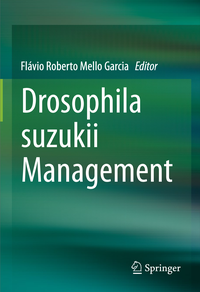
The new book on “Drosophila suzukii Management” gathering research from leading scientists in the management of the invasive pest D. suzukii around the globe, was published by Springer Nature. We contributed the chapter “Conditional Expression Systems for Drosophila suzukii Pest Control” and our Ph.D. student Ms. Syeda A. Jaffri is the first author of this chapter. For more details about this book click here.
2020-10 | Special issue on sterile male insect strains published in BMC Genetics

1) Handler & Schetelig (BMC Genetics 21:137) evaluated the transposable element hopper from B. dorsalis;
2) Yan & Scott (BMC Genetics 21:141) developed a transgenic sexing system in Lucilia cuprina;
3) Concha et al. (BMC Genetics 21:143) generated early female lethal strains in the New World Screwworm; and
4) Yan et al. (BMC Genetics 21:146) characterized four cellularization genes from Drosophila suzukii.
2020-10 | Men only! .... publication in Scientific Reports
Congratulations Rosi for the new publication in Scientific Reports! Efficient SIT programs require the release of a male-only population. Economically the best way to get that is by transforming female embryos into male adults. How’s that possible? We showed it, using CRISPR/Cas9 HDR site-specific mutagenesis on the transformer 2 gene. Check out more here!
2020-10 | DAAD Scholarship for Lucas Prates!
DAAD Scholarship holder joined AG Schetelig. Since October 2020, Lucas Prates joined our research group as DAAD scholarship holder of the Programme “Research Grants – Doctoral Programmes in Germany, 2020/21”. The research project is focused on the sustainable control of the invasive disease vectors Aedes aegypti and Aedes albopictus by novel approaches. Welcome, Lucas!
2020-10 | Publication in the Journal of Insect Physiology

Our paper “CRISPR/Cas9 mediated disruption of the white gene leads to pigmentation deficiency and copulation failure in Drosophila suzukii”, is now published in the Journal of Insect Physiology. We congratulate our student, Judith Ziemek, who did her Bachelor thesis with us, analyzing the mating behavior of the white mutants, and is the second author of this paper.
2020-09 | Scholarship for Ebthal Farag
Ms. Ebthal Zareef Abdalfatah Farag successfully completed her practical course in the laboratory course MP156 with the topic “Gene isolation and evaluation for CRISPR-based biocontrol strategies of the invasive pest Drosophila suzukii”. She received the “Graduation scholarship“ for international students at the JLU Gießen, which is financed by the DAAD and the State of Hesse in 2020. Congratulations Ebthal!
2020-08 | ***Open for submissions until March 2022***: special issue in JIA

2020-08 | Farewell and good luck for Bashir

2020-04 | Publication on bicistronic protein expression in D. suzukii in IBMB

2020-04 | First SINO-German collaboration meeting
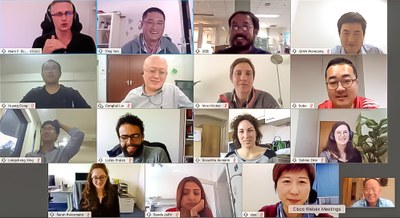
The first joint video meeting with the Agricultural Genomics Institute of the Chinese Academy of Agricultural Sciences (CAAS) was held online under the framework of the “SINO-German Mobility Program” (DFG-NSFC, Germany-China, 2020-2022). Both sides introduced their teams, research plans and discussed the roadmap for future collaboration. We’ll continue the information exchange, project planning, and joint publication efforts, despite the hurdles of the COVID pandemic.
The “SINO-German Mobility Program” which facilitates bilateral cooperation between top research groups from China and Germany, was awarded in Nov. 2019 to us by the DFG-NSFC (2020-2022). In this program, we will collaborate with the Agricultural Genomics Institute at the Chinese Academy of Agricultural Sciences (AGIS-CAAS, China) under the topic “Development of Next-Generation Control Strategies for Important Invasive Species Based on Metagenomic Analysis”. AGIS-CAAS is one of the leading institutes in the world that address genome research in economically important agricultural species. Combining our expertise in modern molecular techniques, sequencing tools, and bioinformatical analysis, this program aims for a better understanding of the biological invasion and provide better solutions for the agricultural landscape in both China and Germany.
2019-09 | Best Talk at the 12th GGL Conference on Life Science, Gießen, Germany

Congratulations to our PhD Rosi for giving the best talk at the 12th Annual GGL Conference of the Life Sciences in 2019 with more than 200 presenters in total!
M. Sc. Roswitha A. Aumann
Best Talk Award: 1st Place; Title: "Seeking temperature-dependent sex reversion in Ceratitis capitata by CRISPR-Cas9 mediated gene editing of transformer-2", 04.-05. September 2019
2019-07 | Best Poster at the Molecular Insect Science Conference 2019, Sitges, Spain

Great job Sarah!
M. Sc. Sarah Petermann, Dr. Sabine Otto & Prof. Marc Schetelig
Eighth International Symposium on Molecular Insect Science
Best Poster Award; "Genetic variability and population dynamics of Drosophila suzukii in Germany", Sitges, Spain, 7-10 July 2019
2019-06 | BRUMMTIER - Gesprächsrunde zum Thema Insekten mit Prof. Marc Schetelig

Berlin. Farming The Uncanny Vally, 17.06.2019
Gesprächsrunde des BMBF geförderten Projektes Farming The Uncanny Vally über das Thema Insekten und deren Nutzung in verschiedensten Lebensbereichen. Mehr zum Projekt, den Ergebnissen, den Workshops und der Interaktion der verschiedensten Player hier.
2019-06 | Aktionstag "Insekten (er)leben" - Es kreucht und fleucht

"Zucker reicht. Mehr brauchen die Männchen nicht zum Leben. Ihre Weibchen sind deutlich anspruchsvoller. Es geht, na klar, um Mücken. Genauer: um die in den Tropen und Subtropen heimischen Gelbfiebermücken. Als Prof. Marc Schetelig am Samstag im Interdisziplinären Forschungszentrum (IFZ) der JLU über seine Forschungsobjekte spricht, wirken sie einen Moment lang relativ menschlich. In Wahrheit sind sie am Aktionstag »Insekten (er)leben« der Institute für Insektenbiotechnologie und Tierökologie ein Beispiel für Insekten als Gesundheitsrisiko. Ob Dengue, Zika oder andere Viren: Die Weibchen saugen nicht nur Blut - sie übertragen auch Krankheiten. Die in seinem Kasten seien aber virenfrei, verspricht Schetelig. Falls eine ausbüxt....."

